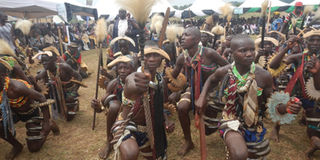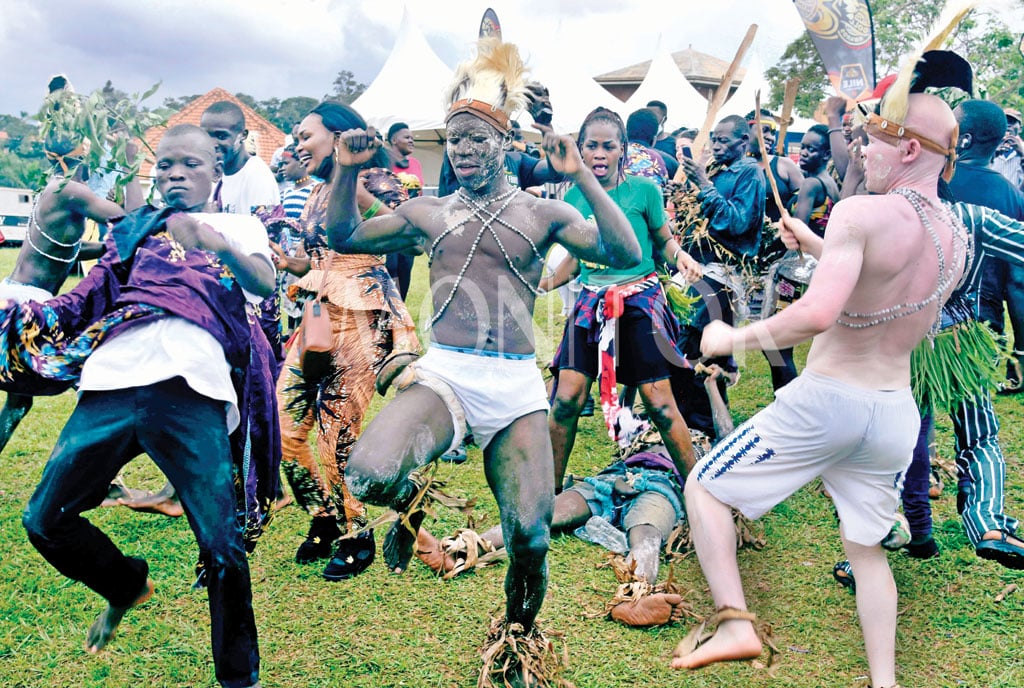Govt starts Imbalu festival preparations

Imbalu candidates perform one of the traditional dances at Mutoto Cultural Site in Mbale City in 2018. Photo / Yahudu Kitunzi
What you need to know:
- The 22 member-committee composed of clan heads, women and youth from the families of Mubuuya, Mwambu, Wanale and the Kenya cluster were instituted by the Minister of Gender, Labour and Social Development, Ms Betty Amongi, last week at Mbale City Hall.
The cultural committee instituted by the government to run this year’s circumcision (Imbalu) ceremony has started work ahead of the official launch slated for August 13 at Mutoto Cultural Ground in Mbale City.
The 22 member-committee composed of clan heads, women and youth from the families of Mubuuya, Mwambu, Wanale and the Kenya cluster were instituted by the Minister of Gender, Labour and Social Development, Ms Betty Amongi, last week at Mbale City Hall.
The committee headed by Mr Godwin Mubuya from Mubuya family came into existence after the faction within the institution failed to agree on who should organise this year’s imbalu in absence of a legitimate Umukhuka of Bamasaba Cultural Institution.
Mr Mubuya, while addressing the press at Mutoto Cultural Grounds at the weekend, said they are a neutral committee entrusted to organise the ritual.
“The process has started and the committees have been formed to ensure a successful celebration,” he said.
The activities at Mutoto Cultural Ground will run for a month. They include millet preparation, cleansing of the candidates, supplications to the gods and unveiling of routes on how circumcision will move from one clan to another.
This fete takes place every year.
Mr Mubuya said they are also in advanced stages of choosing a person who will play the role of Umukhuka in case the government doesn’t gazette any by August 13.
“As organising committee, we will communicate with the person who will be in the shoes of Umukhuka,” he said.
Umukhuka dilemma
For the past two years, the government has failed to gazette any of the parallel cultural heads in the institution, claiming they were both elected irregularly.
The duo, Mr Mike Jude Mudoma from Buyobo clan, and Mr John Wagabyalire from Halasi clan, [Mwambu family] were elected in 2020 by separate factions.
Mr Mudoma was elected by the faction led by Mr Nelson Wedaira, the speaker of the general assembly of the institution, and Mr Wagabyalire was elected by the faction led by Mr Geoffrey Wepondi, the secretary general of the institution.
Elders suggest that in case the government fails to gazette any of the parallel cultural heads, the first Umukhuka, Mr Wilson Wamimbi, will be called upon to preside over the ceremony.
Mr Wamimbi, who hails from Wanale family was the first Umukhuka of the institution after its formation in 2010.
Mr Umar Njovu, the vice chairperson of the organising committee, said they have a budget of close to Shs1billlion.
“We are soliciting more than one billion shillings from Bamasaba and other stakeholders to facilitate the function,” he said, adding that the money will be used, among other things, to renovate holy shrines.
Ms Amongi said there is a need for the council of elders or clan leaders to come up with a mechanism of conducting new elections.
“At the moment none of the two claiming the throne were validly elected and, therefore, we have guided them that a council of elders or clan leaders can come up with a mechanism of conducting new elections,” she said.
Mr Dominic Mafabi Gidudu, the minister of State for Elderly Affairs, said there is a need to preserve the dignity of Bamasaba culture.
“We need to resolve conflicts because the five-year term for the Mwambu family is passing,” he said.
Mr Richard Wanda, the MP for Bungokho Central in Mbale District, and also the chairperson of Bugisu Parliamentary Caucus, said lack of a sitting Umukhuka had caused a lot divisionism.
Umukhuka crisis
The institution is yet to have a new cultural leader, with warring factions claiming the seat. According to the constitution of Inzu Ya Masaba, Article 8.4, the elected cultural leader is supposed to serve only five years and not be subjected to reelection. The institution conducts rotation leadership among three families of Mwambu, Mubuuya and Wanaale. The descendants of Mwambu live in Sironko and Bulambuli districts, Mubuuya (Manafwa, Bududa and Namisndwa) and Wanaale in Mbale district and Mbale city.




